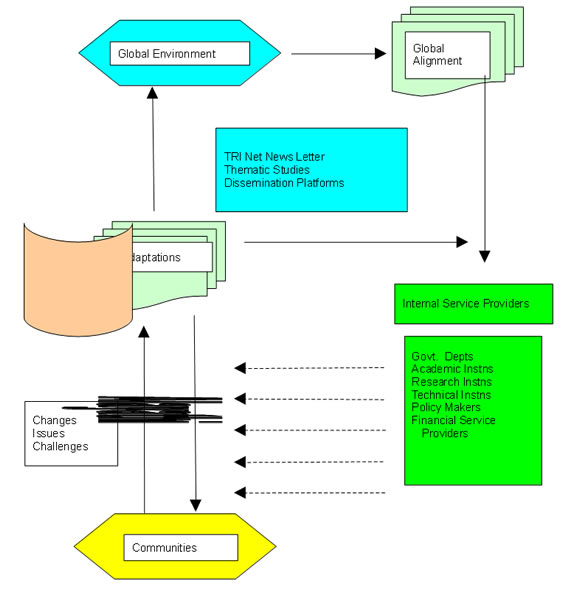
TRINet
TRINet, the Tsunami Rehab Information Network was initiated by the South Indian Federation of Fishermen Societies (SIFFS), International Collective in Support of Fishworkers (ICSF), and Bhoomika Trust in March 2005. The objective was to address the information needs of the tsunami affected people and the various stakeholders in the rehabilitation process.
A number of workshops and meetings were organised both at the state level and at the district level by TRINet – choosing topics of current relevance and with quality resource persons. These meetings were very well attended and had been a source of learning for different stakeholders. The TRINet news products kept updating the stakeholders on a wide range of issues including technology used in fisheries, information on alternate livelihoods, health and hygiene education, rainwater harvesting recycling methods, water and sanitation, air pollution, and global warming. In addition, it specifically reached out to the affected communities through the Tamil newsletter “Alayathi”.
The activities/ programmes carried out by TRINet highlight the fact that it had been playing a key role in disseminating information to various segments during the rehabilitation phase. In addition, TRINet played an advocacy role among the state machinery for taking things forward for policy formulation and further action. While providing information and enhancing the knowledge of the NGOs, civil society organisations and communities, it also provided a platform for exchange of ideas/information and motivating the affected communities to voice their needs and concerns. TRINet over the first three years (2005 to 2008) built a niche for itself for involvement with various categories of people/ communities, NGOs, INGOs and government departments, as well as research and academic institutions and fulfilling its role as being an instrument for empowering the communities in the coastal areas.
There has been a growing demand from several quarters to rejuvenate and strengthen TRINet for the benefit of the coastal communities and various other stakeholders. It has been pointed out that TRINet holds a promise in evolving as a knowledge management system for coastal issues and disaster risk reduction. BEDROC team has been closely associating with TRINet as part of NCRC related activities. BEDROC has Knowledge Management as one of its core areas and therefore TRINet perfectly fits into its overall frame of activities. Therefore, BEDROC has taken the initiative to take TRINet forward.
TRINet has transitioned into "The Resource and Information Network: for the coast" from 1st April 2008. Three years after the Indian Ocean tsunami, TRINet's focus has changed from rehabilitation to long term development of the coastal zone. Specifically, TRINet's focus will be on providing information on coastal issues from the perspective of the coastal communities whose livelihoods depend extensively on access to coastal resources.
Objectives of TRINet
1.To ensure that policy makers, government agencies, NGOs, CBOs, and CSOs, and coastal communities have access to timely and reliable information on critical issues relating to coastal area development vis-à-vis climate change and disaster risk reduction
2.To sustain a neutral, dynamic and up-to-date platform for debating and sharing of information and knowledge on pertinent issues and concerns relating to coastal area development vis-à-vis climate change adaptations and disaster resilience
3.To conduct thematic studies in specific areas related to the above themes and disseminate the findings among stakeholders including policy makers and the communities
Knowledge Management Framework
The TRINet format of collecting, collating, and sharing information in electronic and print forms and also through direct stakeholder interactions was found to be every effective during tsunami rehabilitation programme. The proposed project would attempt to develop and maintain a Knowledge Management Framework with the following components.
An information base for coastal areas
- Regular tracking, information collection, inquiry, and creation of an information base on issues relating to coastal area development and disaster risk reduction
- Using the information base thus developed for keeping the web site updated, and for newsletters in both electronic and print media
Facilitating brainstorming through stakeholder workshops
- Organising workshops and discussion forums where policy makers, administrators, implementing agencies, sector experts, and communities would come together and discuss issues of current relevance. These are meant to enhance the understanding of various stakeholders on the issues as well as to share the stakeholder perspectives.
- Organising consultations on specific topics and issues between policy makers and administrators, and other stakeholders including the communities. These would help in community opinions represented to the policy makers and administrators.
Thematic studies and dissemination of results
- Issues that need special attention and detailed study would be subjected to detailed research, the results of which would be consolidated and presented in the existing carriers.
Special publications would be brought out on the results of the thematic studies and research conducted from time to time. These publications would be made available to various stakeholders including policy makers

TRINet also publishes a monthly email newsletter that can be read here.
Recent Blog
- Hats off to the government’s servants
- Thane Cyclone: An Indication For Re-visioning Disaster Management
- Tsunami lessons for Tohoku from Tamil Nadu
- TRINet Newsletter February 2012
- Cyclone Thane -- Disaster Preparedness and Response
- TRINet Newsletter January 2012
- Impact of ICT on Climate Change and Agriculture in India
- TRINet Newsletter July 2011
- TRINet Newsletter May 2011
- The End of Days for Endosulfan










